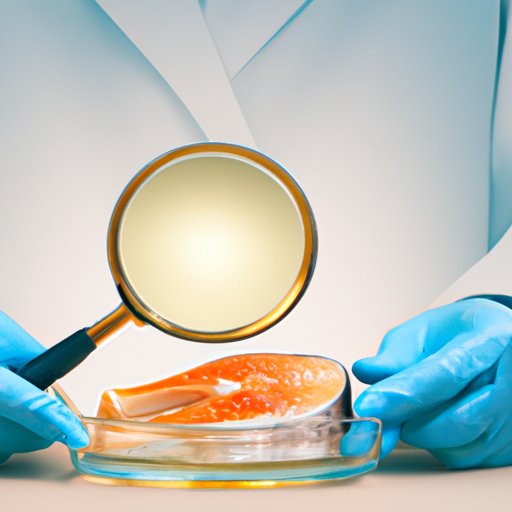Introduction
Seafood has long been a major staple in many diets around the world. But is it really healthy? The answer is yes – when consumed in moderation and with the right preparation methods, seafood can provide a wealth of essential nutrients and health benefits. In this article, we’ll explore why seafood is a healthy choice, the latest research on seafood nutrition, and tips on how to incorporate more seafood into your diet.
Exploring the Health Benefits of Seafood
Seafood is an excellent source of essential nutrients that are important for maintaining a healthy body and mind. Here are some key nutrients found in seafood and their associated health benefits:
Omega-3 Fatty Acids
Omega-3 fatty acids are polyunsaturated fatty acids that are known to have anti-inflammatory properties and can help reduce the risk of heart disease. They are found in cold-water fish such as salmon, mackerel, and tuna, as well as in shellfish like oysters and mussels. According to a study published in the British Medical Journal, “Eating at least one portion of oily fish per week is associated with lower rates of mortality from all causes, coronary heart disease, and stroke.”
Lean Proteins
Seafood is also an excellent source of lean proteins, which are important for building and repairing tissues and helping to regulate hormones. Lean proteins are especially beneficial for those trying to lose weight, as they help to keep you feeling fuller for longer. A study published in the American Journal of Clinical Nutrition found that “consuming meals containing fish protein may increase satiety and reduce subsequent energy intake.”
Vitamins and Minerals
Seafood is also packed with vitamins and minerals such as selenium, zinc, vitamin D, and iodine. These nutrients are essential for a wide range of bodily functions, including metabolism, immunity, and brain function. A study published in the journal Nutrients found that “iodine deficiency is one of the most common micronutrient deficiencies worldwide, and seafood is one of the best dietary sources of this essential mineral.”
What Types of Seafood are Best for Your Health?
When it comes to choosing seafood, there are a few different types to consider. Here’s a look at some of the most popular options and their associated health benefits:
Fish
Fish are an excellent source of lean proteins, omega-3 fatty acids, and vitamins and minerals. Some of the most popular varieties include salmon, mackerel, tuna, and trout. These fish are particularly high in omega-3 fatty acids, which can help reduce inflammation and improve heart health.
Shellfish
Shellfish such as shrimp, crab, and lobster are also a great source of lean proteins and essential vitamins and minerals. Shellfish are particularly high in selenium, which helps to protect cells from damage and can help boost the immune system.
Canned/Frozen Seafood
Canned and frozen seafood can be a convenient way to get your daily dose of seafood without having to worry about freshness. Canned tuna, salmon, and sardines are all good sources of omega-3 fatty acids and other essential vitamins and minerals. However, it’s important to check the label for added salt or sugar before purchasing.

The Latest Research on Seafood Nutrition
Over the past few years, there have been several studies conducted on the health benefits of seafood. Here’s a look at some of the latest findings:
Studies on Omega-3 Fatty Acids
A study published in the journal Circulation found that consuming two servings of omega-3 rich fish per week was associated with a 30% lower risk of coronary heart disease. The study also found that consuming more than three servings per week was associated with an even greater reduction in risk.
Studies on Other Vitamins and Minerals
A study published in the journal Nutrients found that seafood is a good source of essential minerals such as selenium, zinc, and iodine. The study also found that seafood consumption was associated with improved cognitive function, reduced inflammation, and lower levels of cholesterol.
Is Eating Seafood Safe?
While seafood can be a healthy and nutritious choice, it’s important to take certain precautions to ensure it’s safe to eat. Here are some key things to keep in mind:
Contamination
Seafood can sometimes be contaminated with bacteria or other toxins, so it’s important to buy from reliable sources and ensure it’s cooked properly. It’s also important to avoid eating raw or undercooked seafood, as this can increase the risk of food poisoning.
Allergies
Some people may be allergic to certain types of seafood, so it’s important to speak to your doctor before making any changes to your diet. If you do experience any allergic reactions after consuming seafood, it’s important to seek medical attention right away.

Tips on How to Incorporate More Seafood into Your Diet
If you’re looking to add more seafood to your diet, here are some tips to help you get started:
Variety
It’s important to mix up the types of seafood you eat to ensure you’re getting a variety of essential nutrients. Try to include a variety of fish, shellfish, and canned/frozen seafood in your diet.
Preparation Methods
It’s also important to choose healthy preparation methods when cooking seafood. Baking, grilling, and steaming are all good options, as they don’t require a lot of added fat or salt. Avoid frying, as this adds unnecessary calories and unhealthy fats.

Debunking Myths about Seafood and Health
There are a lot of misconceptions about seafood and health, so it’s important to separate fact from fiction. Here are two of the most common myths debunked:
Mercury
Many people believe that eating seafood can lead to mercury poisoning, but this is simply not true. While some types of fish can contain higher levels of mercury, the health benefits of eating seafood far outweigh the risks.
Cost
Another common myth is that seafood is too expensive to be part of a healthy diet. In reality, there are plenty of budget-friendly options available, such as canned tuna, salmon, and sardines, as well as frozen fish fillets.
Conclusion
In conclusion, seafood is an excellent source of essential nutrients and can provide a wealth of health benefits when consumed in moderation. From omega-3 fatty acids to lean proteins, vitamins, and minerals, seafood can help to improve overall health and wellbeing. When selecting seafood, it’s important to choose a variety of types and prepare them using healthy methods. Lastly, it’s important to debunk any myths about seafood and health. By following these guidelines, you can incorporate more seafood into your diet and enjoy the health benefits it provides.
(Note: Is this article not meeting your expectations? Do you have knowledge or insights to share? Unlock new opportunities and expand your reach by joining our authors team. Click Registration to join us and share your expertise with our readers.)
